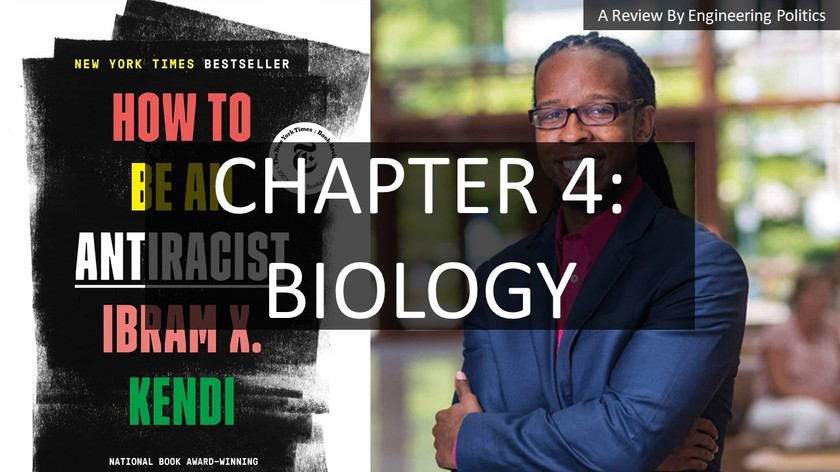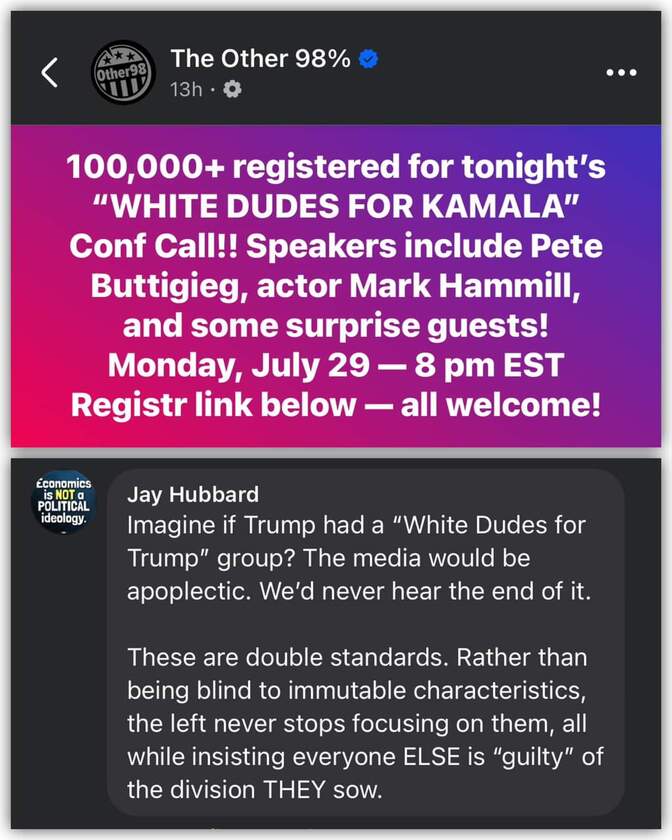
A new day, a new review. Kendi starts out the chapter by defining Biological Racist and Biological Antiracist. A quick note I’ve thought of but never mentioned until now is the Orwellian newspeak style application of words Kendi uses in this book. If you’re like me and you feel the need to read books fully and completely (thanks OCD), you’ll read the appendix of books just so you don’t miss anything. In Orwell’s 1984, the appendix goes through the logic behind newspeak, the new language of 1984 put in place by Big Brother, and Orwell gets very detailed as to why changes were made to language. It wasn’t the words that were changing, or even the meaning of the words, it was the elimination of words and their derivations. This may not seem like a big change, but by eliminating certain words, the remaining word’s definitions inherently changed. For example, the word bad was eliminated because you can just say not good. The word good was still untouched and had its original definition, but eliminating its counterpart changed the spectrum of good to bad to the binary of good and not good. There was no kinda good or kinda bad, just good or not good. Kendi does the same thing here. There is racist and antiracist and nothing else.
“BIOLOGICAL RACIST: One who is expressing the idea that the races are meaningfully different in their biology and that these differences create a hierarchy of value.
BIOLOGICAL ANTIRACIST: One who is expressing the idea that the races are meaningfully the same in their biology and there are no genetic racial differences.”
I believe it was Eric Weinstein who I heard say, “biology is the study of uncomfortable truths,” or something similar to that sentiment. There are small differences in biology between different races. We are predisposed to different diseases and biological reactions to different environmental variables, but something I will agree with Kendi on is these differences are not often meaningful. Now, they can be meaningful in some contexts, such as in the medical field, but we don’t find different races to be so unique that they would be considered different species. There are much more meaningful differences between men and women then people of different races. So, I basically agree with Kendi’s definition of biological racist, but there is a critical contradiction in his second term that should seem obvious to anyone. Races being “meaningfully the same” implies there are differences, but they aren’t very important. There being “no genetic racial differences” explicitly states there are no differences, meaningful or not meaningful. He starts out with a soft implication to bridge the definitions of biological racist and antiracist, but then blows up that bridge by saying there are no genetic differences at all. I don’t want to focus heavily on why this makes no sense because I don’t find these mostly meaningless biological differences interesting, but it does go to show how willing Kendi is to dishonestly present his argument and that behavior pops up throughout the book.
“[G]eneralizing the behavior of racist White individuals to all White people is as perilous as generalizing the individual faults of people of color to entire races.”
“An antiracist treats and remembers individuals as individuals.”
Stereotypes can be very harmful and certainly racist. Stereotypes are often used in a comedic setting where offensiveness and provocation is the goal. We’ve all seen Dave Chappelle’s skits where he lightens his skin and talks with a “white accent” to portray your “typical white person.” Is this racist? Technically yes, but we don’t demand Dave Chappelle’s cancellation because we understand the context it’s in. Stereotypes and race-based assumptions can be very damaging in other contexts like hiring practices. We don’t want to discriminate based on race when we are hiring because that means we are selecting from a smaller talent pool. It’s bad business practice, and also immoral. The last line where Kendi claims antiracists treat people as individuals is true in how we ought to treat people, but this is the most glaring inconsistency in Kendi’s own behavior and world view and is completely ignored by all critical theorists. This is a typical trick of the progressive Left, to claim we must treat people as individuals, and then explicitly refer to individuals by their group identity. His final claim is completely at odds with his own ideology and it’s amazing he can’t see that.
Kendi goes on for a while about one of my favorite progressive topics, microaggressions. I’m not going to give any quotes because he is all over the place on this one. He explains the origins of the term microaggression by Harvard psychiatrist Chest Pierce in 1970. It was originally used for small aggressions from white people towards black people, but then became a more generalized term for small aggressions between different groups by Columbia University psychologist Derald Wing Sue in 2007. Jonathan Haidt and Greg Lukianoff explain microaggressions best in their book The Coddling of the American Mind. “If the aggressive act is minor or subtle, then the term ‘microaggression’ seems well suited for the situation. But aggression is not unintentional or accidental. If you bump into someone by accident and never meant them any harm, it is not an act of aggression, although the other person may misperceive it as one.” Kendi uses an example where his white teacher seemed to be calling on the white students in class more often, even though the class only had three white students, which could be considered a microaggression if the act was intentional by the teacher. This is not made clear, but that is the implication. What is most profound to me about this section was Kendi’s disdain for the use of the word microaggression outside of the white versus black context. He actually seems mad at the fact it was generalized by Derald Wing Sue and can now be used to describe other forms of aggression. It’s almost like Kendi doesn’t like it when the oppression narrative drifts away from focusing only on race. I too don’t like the popularization of the term microaggressions, but I don’t like it because of the damaging message it sends, not because it slightly decreases the purchasing power of my oppression capital.
“Imagining away the existence of races in a racist world is as conserving and harmful as imagining away classes in a capitalistic world – it allows the ruling races and classes to keep on ruling.”
We are starting to dive deeper in Kendi’s complete ideology which is based in Marxism. This is important because it helps further develop our understanding of his world view. Everything is a struggle for power and the only way to fix our broken system is by creating policy to change human behavior. This doesn’t mean we ought not to ever create a policy that incentivizes or disincentivizes a specific behavior, but we know policy does not often result in what we want it to. The War on Drugs didn’t eliminate drug use, it made criminals of non-violent offenders. We can calibrate policy to get closer to the desired effect, but that normally takes more accompanied policy and restrictions that can leave a few dead bodies along the way, especially if we ignore the original intentions of the policy agenda and exchange it to only target equitable outcomes. Kendi continues on the theme of how we should see race.
“Assimilationists believe in the post-racial myth that talking about race constitutes racism, or that if we stop identifying by race, then racism will miraculously go away. They fail to realize that if we stop using racial categories, then we will not be able to identify racial inequity. If we cannot identify racial inequity, then we will not be able to identify racist policies. If we cannot identify racist policies, then we cannot challenge racist policies. If we cannot challenge racist policies, then racist power’s final solution will be achieved: a world of inequity none of us can see, let alone resist. Terminating racial categories is potentially the last, not the first, step in the antiracist struggle.”
“To be antiracist is to recognize the reality of biological equality, that skin color is as meaningless to our underlying humanity as the clothes we wear over that skin.”
“To be antiracist is to also recognize the living, breathing reality of this mirage, which makes our skin colors more meaningful than our individuality.”
The final thoughts of this chapter are contradicting the original theme of the chapter. We should see everyone as individuals but not categorizing those individuals by race is racist. Treating everyone as equals in terms of biology is a great idea because it shouldn’t mean anything to our underlying humanity. This is a terrific sentiment and I’m not accusing Kendi of getting off theme when it comes to biology, but when he conflates biological equality with equity in terms of something like medical outcomes, he completely ignores several variables in the multivariate equation that contributes to medical outcomes, such as diet and exercise. This chapter is full of contradictions like these, but we are not allowed to question this, or we are racist.
Thanks for reading my rant style review of the fourth chapter of How to be an Antiracist by Ibram X. Kendi. Please let me know if you find this useful. My goal here is to explain each chapter enough and in a somewhat objective way so others don’t waste their time and money on investigating this material themselves. I know this kind of goes against the logic of investigation where you want to read the source material yourself and build your own conclusions, but this is a very shallow read that does not strain the mind, in any positive way at least, like any proper academic book should. Please leave a comment with your thoughts.
Thanks for being a part of the Engineering Politics Locals Community!

I was listening to some news updates when I heard this CNN clip about the potentially hazardous water in East Palestine, and as soon as I heard her ask the question about whether or not her guest would drink the water, I IMMEDIATELY thought of this clip from South Park. Enjoy.
In this special episode of The Engineering Politics Podcast, Truman from Return To Reason is back for a new video and podcast series titled ‘Revisiting The Road To Serfdom’ where we review F.A. Hayek’s classic work, The Road To Serfdom. This episode covers ‘Chapter 15: The Prospects of International Order’.
This will be an ongoing series that covers the entire book. We put a ton of work into making this insightful and relevant, so we hope you enjoy watching/listening as much as we enjoyed reading and recording.
Become a subscriber of the Engineering Politics Locals Community to support this content. Also, consider joining the @ReturnToReason Locals Community to show Truman some support.
In this episode of The Engineering Politics Podcast, I team up with Truman from @ReturnToReason to interview one of the most intelligent and influential creators in the space of philosophy today. Stephen R.C. Hicks is a Professor of Philosophy at Rockford University, Executive Director of the Center for Ethics and Entrepreneurship, and Senior Scholar at The Atlas Society. He has written many books including Explaining Postmodernism and Nietzsche and the Nazis. We bring him on to talk about the social and political issues we are currently facing in America, and the West more broadly, and what the collectivist ideas of Jean-Jacques Rousseau might have to do with it.
Become a subscriber of the Engineering Politics Locals Community to support this content. Also, consider joining the @ReturnToReason Locals Community to show Truman some support.
In this special episode of The Engineering Politics Podcast, Truman from Return To Reason is back for a new video and podcast series titled ‘Revisiting The Road To Serfdom’ where we review F.A. Hayek’s classic work, The Road To Serfdom. This episode covers ‘Chapter 15: The Prospects of International Order’.
This will be an ongoing series that covers the entire book. We put a ton of work into making this insightful and relevant, so we hope you enjoy watching/listening as much as we enjoyed reading and recording.
Become a subscriber of the Engineering Politics Locals Community to support this content. Also, consider joining the @ReturnToReason Locals Community to show Truman some support.
In this episode of The Engineering Politics Podcast, I team up with Truman from @ReturnToReason to interview one of the most intelligent and influential creators in the space of philosophy today. Stephen R.C. Hicks is a Professor of Philosophy at Rockford University, Executive Director of the Center for Ethics and Entrepreneurship, and Senior Scholar at The Atlas Society. He has written many books including Explaining Postmodernism and Nietzsche and the Nazis. We bring him on to talk about the social and political issues we are currently facing in America, and the West more broadly, and what the collectivist ideas of Jean-Jacques Rousseau might have to do with it.
Become a subscriber of the Engineering Politics Locals Community to support this content. Also, consider joining the @ReturnToReason Locals Community to show Truman some support.
In this special episode of The Engineering Politics Podcast, Truman from @ReturnToReason is back for a new video and podcast series titled ‘Revisiting The Road To Serfdom’ where we review F.A. Hayek’s classic work, The Road To Serfdom. This episode covers ‘Chapter 14: Material Conditions and Ideal Ends’.
This will be an ongoing series that covers the entire book. We put a ton of work into making this insightful and relevant, so we hope you enjoy watching/listening as much as we enjoyed reading and recording.
Become a subscriber of the Engineering Politics Locals Community to support this content. Also, consider joining the @ReturnToReason Locals Community to show Truman some support.














